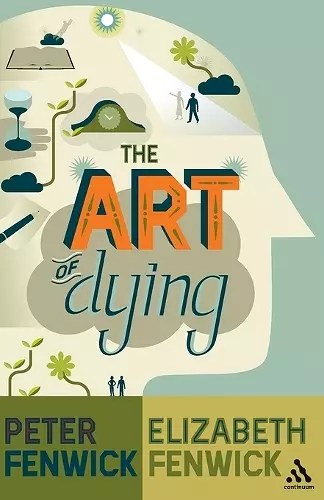The Art of Dying
Elizabeth Fenwick author Dr Peter Fenwick author
Format:Paperback
Publisher:Bloomsbury Publishing PLC
Published:26th Jun '08
Should be back in stock very soon

A contemporary version of the medieval Ars Moriendi - a manual on how to achieve a good death.
A manual on how to achieve a good death. It looks at how other cultures have dealt with death and the dying process (The Tibetan 'death system', and Swedenborg).Is there an art to dying? And if there is, what can we do to achieve a good death? We have few special rituals to prepare for death, or to mark it, and we often fail to help the dying prepare for death. "The Art of Dying" contains accounts by the dying, and those who have been with the dying in their final hours, which help us to understand that death is a process. The experiences suggest that we are looked after throughout the transition from life to death, and taken on a journey into love and light by loved ones who come back to take us. Other accounts are from people who have been emotionally close to someone and who, unaware that the person they love is dying, experience a sudden strong sense of their presence or an intimation of their death. Rational, scientific explanations for these experiences are hard to find, and it is almost impossible, in the face of them, to sustain the current scientific view that our consciousness is entirely brain-based, and that it is extinguished at the moment our brain ceases to function. The world is more highly interconnected and more complex than the simple mechanical model we have followed for so long. The evidence suggests we are more than brain function, and that something - soul or spirit or consciousness - will continue in some form or another for a while at least. We can ensure a "good death" for ourselves and help those we love achieve it too. "The Art of Dying" demonstrates that we can face death with a peaceful and untroubled mind; that death is not a lonely or a fearful journey, but an intensely hopeful one.
"Deathbed visions and coincidences are often classified as supernatural phenomena and the stuff of bad late-night television. But do such classifications do a disservice to the experiences of the dying and the bereaved? Through lengthy oral histories of eerie telepathic and paranormal phenomena, this book attempts to strip away the stigma from analyzing the inexplicable —yet commonly reported—odd incidences that accompany death—the "feeling of unease," the visit from the dying. The authors argue that these reported experiences must be studied, even if they deviate from conventional understanding of the "real" or "normal." What if our minds were wired in a way that has not yet been documented by science? What if hospice workers were more open to the experiences of the dying? Although the Fenwicks' exuberance frequently feels naïve, the scores of testimonies—as well as Peter Fenwick's renown as a neuropsychiatrist —do lend their queries credibility. Ultimately, the authors demonstrate that it may be immaterial if these stories are scientifically plausible since merely documenting these incidences can heighten our understanding of the mind during death and enhance our ability to comfort the dying and their families." - Publishers Weekly, May 2008
Title in article about the book and authors in Daily Telegraph, 2008.
Reviewed in Clinical Medicine Journal of the Royal College of Physicians of L, 1 April 2009 -- Alex Paxton
"The authors not only manage to show that it isn't always all bad, but raise profound questions about the nature of consciousness." - Journal of Consciousness Studies, December 2008.
"Elizabeth and Peter Fenwick have written an Ars Moriendi for our age...illuminating and very moving...The book is highly recommended, as death is something we all need to come to terms with in order to live a full life." De Numine, Autumn 2009 -- Marianne Rankin
"...interesting because a contemporary issue is taken and dealt with sensitively...The book's purposes are extensive, including academic, personal interest or within a hospice setting where death is ever-present. It refers to other books throughout which makes it all the more effective for which-ever of the above it's utilized. Moreover, despite the fact that the topics within the book are personal, they are weighed up with both empathy and impartiality, identifying with believers and non-believers alike." De Numine, Autumn 2009 -- Charlotte Deakin
ISBN: 9780826499233
Dimensions: 196mm x 132mm x 20mm
Weight: 282g
264 pages